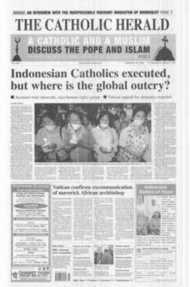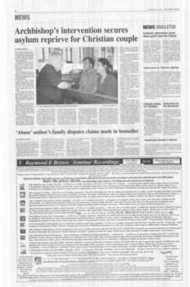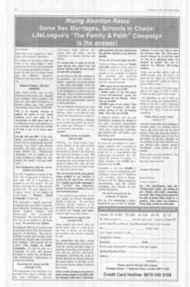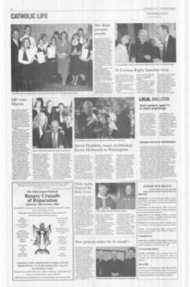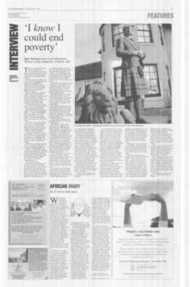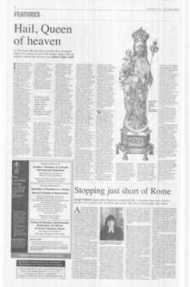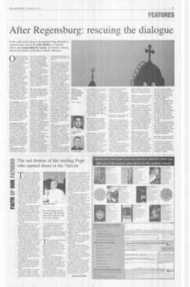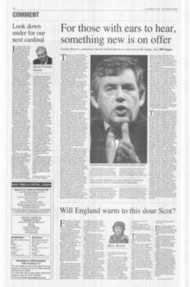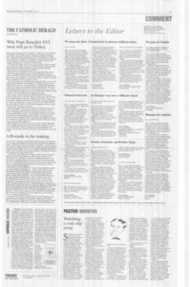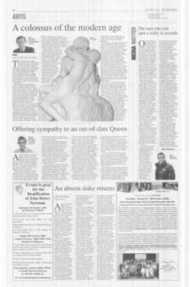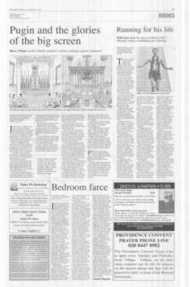Page 5, 29th September 2006
Page 5

Report an error
Noticed an error on this page?If you've noticed an error in this article please click here to report it.
Tags
Share
Related articles
Vatican Plans To Open Secret War Archives
Release Of Secret Vatican Archives Vindicates Pius Xii
Doubts Over Turkey
Vatican To Open Secret Archives To Historians
Open Secret Archives, Demands Vatican Holocaust Commission
Archives debunk 'Hitler's Pope' theories
FROM CAROL GLAT2 IN VATICAN CITY Doasvosris made available from the Vatican Secret Archives will allow scholars to challenge claims that the Church failed to oppose Nazism, fascism and other forms of totalitarianism, a Jesuit historian has said.
Fr Giovanni Sale, historian of the Jesuit journal La Civilt4 Cattolica, said documents relating to the 1922-1939 pontificate of Pope Pius XI will have an impact on political and religious history.
What emerges is an even clearer picture of the Church as being "steadfast in the fight against totalitarianism, against fascism, against Nazism, but also against communism," he told Vatican Radio.
The conduct of the Nazi-era popes has often been the subject of speculation, most recently in John Cornwell's Hitler's Pope.
After years of preparation, the Vatican archive office opened up to researchers all the documentation from the pre-World War El pontificate of Pope Pius. The documents were considered especially sensitive because they covered the period in which Cardinal Eugenio Pacelli, the future Pope Pius XII, served a.s nuncio to Germany and then as Vatican secretary of state.
Mr Cornwell accused Cardinal Pacelli of having pm-German feelings that coloured his World War II policies as pope, while a 2001 book, The Popes against the Jews, claimed top Church officials had a hand in fomenting anti-Semitism in the 20th century.
Vatican historians have repeatedly rejected such claims as false.
Fr Sale said that the pre-World War II documents are available so scholars "will have the possibility to truly rewrite important pages of 20th-century history — this time based on solid and documented foundations."
He said certain positions that were "often fruit of ideological prejudices" could now be corrected.
An article in the Italian Catholic daily
Avvenire described some of the contents found in the newly available archives by citing a full series of notes written by Cardinal Pacelli concerning the impending 1938 visit of Adolf Hitler in Rome to meet Italian
dictator Benito Mussolini. • The Vatican secretary of state wrote of his alarm that Mussolini planned to parade the Gelman leader upon his arrival along the Via della Conciliazione leading to the Vatican. He urged officials to tell Mussolini such a plan would "greatly disappoint" and "vex" the Pope. The cardinal also asked whether such "glorification pushed to such excess of an avowed enemy" was in violation of the 1929 Italy-Vatican concordat that guaranteed Vatican sovereignty.
The cardinal also wrote to the Italian bishops, urging them to decline attending any ceremonies honouring Hitler's visit to Rome and saying "the Holy Father wishes [the bishops to] abstain from accepting" the invitations.
Cardinal Pacelli's notes also detail his criticism of Austrian bishops who announced they NV= in favour of the 1938 Anschluss — Nazi Germany's annexation of Austria saying those bishops showed "a lack of faith and loyalty" to the Church. In a different note, he added that Hider was "the greatest persecutor of the Church".
Just before Hitler arrived in Rome in May 1938, Pope Pius XI left the Vatican for Castel Gandolfo and, in an audience there, said "very sad things" were happening "far away and nearby" as a new cross was being planted in Rome, "and it's riot the cross of Christ".
Fr Sergio Pagano, the prefect of the Vatican Secret Archives, said in the Vatican newspaper L'Osservatore Romano that the documents offered "a fascinating survey" of the Vatican's diplomatic dealings at such a crucial time in history.
The meticulous notes Cardinal Pacelli took in his almost daily meetings with the pope are "very precious," he wrote.
blog comments powered by Disqus


